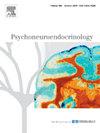Cortisol and testosterone jointly affect adolescent fairness
IF 3.6
2区 医学
Q2 ENDOCRINOLOGY & METABOLISM
引用次数: 0
Abstract
Fairness is crucial in social interactions, shaping relationships and fostering cooperation, especially during adolescence. The developmental period, characterized by significant hormonal changes such as fluctuations in cortisol and testosterone levels, is pivotal for physiological and behavioral maturation. Despite the importance of the hormones, studies investigating their interaction effects on fairness within adolescent populations remain limited. The current study explored adolescent fairness development and how cortisol (bedtime basal cortisol and cortisol awakening response, CAR) and testosterone interacted in strategic and pure fairness towards friends and strangers, using adapted versions of the Ultimatum Game (UG) and Dictator Game (DG), separately, in 381 typically developing adolescents (37 % female, Mage = 14.6 years, SDage = 1.95). As adolescents matured, they increasingly favored friends over strangers in both strategic and pure fairness decision-making. Testosterone was positively associated with allocation differences in strategic fairness only at high bedtime basal cortisol levels. Additionally, testosterone was positively correlated with allocation differences in strategic fairness at low CAR levels but negatively at high CAR levels. This hormonal pattern was observed only in male adolescents. These findings underscore sex-specific patterns in dual-hormonal influences on adolescent fairness decisions and highlight the role of physiological hormones in the development of moral values in distinct ways for males and females.
皮质醇和睾酮共同影响青少年的公平
公平在社会交往、塑造关系和促进合作中至关重要,尤其是在青少年时期。发育时期的特点是显著的激素变化,如皮质醇和睾酮水平的波动,是生理和行为成熟的关键。尽管激素很重要,但在青少年群体中调查它们对公平的相互作用的研究仍然有限。目前的研究探讨了青少年公平的发展,以及皮质醇(睡前基础皮质醇和皮质醇觉醒反应,CAR)和睾丸激素如何在对朋友和陌生人的策略和纯粹公平中相互作用,分别使用了最后通牒游戏(UG)和独裁者游戏(DG)的修改版本,在381名典型发育的青少年中(37% 女性,年龄= 14.6岁,年龄= 1.95)。随着青少年的成熟,他们在战略决策和纯粹的公平决策中越来越倾向于朋友而不是陌生人。只有在高睡前基础皮质醇水平时,睾丸激素与策略公平分配差异呈正相关。此外,在低CAR水平下,睾酮与策略公平分配差异呈正相关,而在高CAR水平下,睾酮与策略公平分配差异呈负相关。这种荷尔蒙模式只在男性青少年中观察到。这些发现强调了双激素对青少年公平决策影响的性别特异性模式,并强调了生理激素在男性和女性道德价值观发展中的不同作用。
本文章由计算机程序翻译,如有差异,请以英文原文为准。
求助全文
约1分钟内获得全文
求助全文
来源期刊

Psychoneuroendocrinology
医学-精神病学
CiteScore
7.40
自引率
8.10%
发文量
268
审稿时长
66 days
期刊介绍:
Psychoneuroendocrinology publishes papers dealing with the interrelated disciplines of psychology, neurobiology, endocrinology, immunology, neurology, and psychiatry, with an emphasis on multidisciplinary studies aiming at integrating these disciplines in terms of either basic research or clinical implications. One of the main goals is to understand how a variety of psychobiological factors interact in the expression of the stress response as it relates to the development and/or maintenance of neuropsychiatric illnesses.
 求助内容:
求助内容: 应助结果提醒方式:
应助结果提醒方式:


